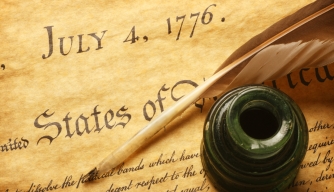We hold these truths to be self-evident, that all men are created equal, that they are endowed by the Creator with certain unalienable Rights, that among these are Life, Liberty and the pursuit of happiness.
Thirty-five words that led to the creation of a nation – the greatest nation the world has ever known – a nation that would change the entire world for the better.
Greatest omission – property!
Wikipedia:
The first and second article of the Virginia Declaration of Rights adopted unanimously by the Virginia Convention of Delegates on June 12, 1776 and written by George Mason, is:
That all men are by nature equally free and independent, and have certain inherent rights, of which, when they enter into a state of society, they cannot, by any compact, deprive or divest their posterity; namely, the enjoyment of life and liberty, with the means of acquiring and possessing property, and pursuing and obtaining happiness and safety.
Yet, Jefferson, with the agreement of his friend, Benjamin Franklin, decided to de-emphasize property in the Declaration of Independence, and that is the greatest omission of all time. Why? Because the right to property is the greatest right to all. The reason I say that is that property is the result of your living and acting, or, in other words, of your life and liberty, and without the right to own property, outright and without the fear that the government can take it from you, there can be no true liberty.
To put it another way:
“You exist in time: future, present, and past. This is manifest in life, liberty, and the product of your life and liberty. The exercise of choices over life and liberty is your prosperity. To lose your life is to lose your future. To lose your liberty is to lose your present. And to lose the product of your life and liberty is to lose the portion of your past that produced it.” [The Philosophy of Liberty]
Jere Moore has been blogging about political matters since 2008. His posts include commentary about current news items, conservative opinion pieces, satirical articles, stories that illustrate conservative principles, and posts about history, rights, and economics.
